Ever since I started studying Japanese over a decade ago, I often heard that playing video games in Japanese was an effective way to study the language.
As appealing as that sounded, this advice rarely worked for me because:
- The language and narratives in the games I enjoyed were always too complicated for my Japanese level. Therefore, I gained neither enjoyment nor ideal study material. It’s hard to enjoy a deep, story-driven game when it takes a herculean effort to comprehend each line of dialogue.
- Games, like other forms of pop culture, are often filled with impractical, outdated, or inappropriate Japanese words, expressions, and styles of speech that I rarely encountered in the real world.
However, as my Japanese ability improved, I found titles that were great complements to my Japanese study regimen. Discovering these games often required me to turn to the past—simpler times in gaming history.
Decision Criteria
To deal with the pitfalls described above, I crafted the content of this article based on the following criteria:
- Games selected for this article include words, kanji, and expressions that you’ll encounter in daily life. This means that popular franchises featured in similar articles (e.g. the Yakuza series) are, sadly, disqualified. Indeed, playing Ghost of Tsushima is an incredible experience, but speaking like a 13th-century samurai warrior won’t help you speak to your modern-day friends, colleagues, and neighbors.
- Games chosen for this article are likely to induce a state of flow. They have narratives and gameplay systems that are relatively straightforward. On the other hand, these games certainly aren’t simplistic. They should challenge and entertain most intermediate and upper-intermediate learners.
The Games
Shenmue (2018 HD remaster)
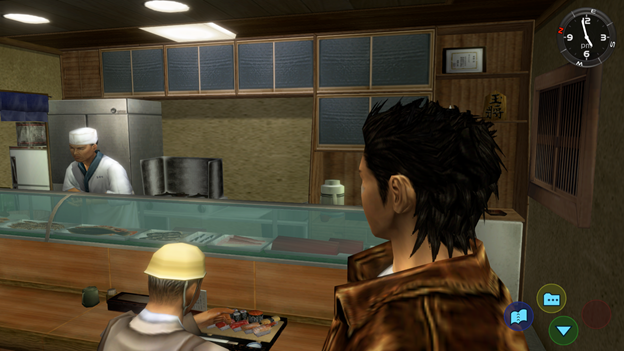
- Version: Xbox One (also available on PlayStation 4 and PC)
- Features: Fully voiced Japanese dialogue with English subtitles
Shenmue, the 1999 Sega Dreamcast magnum opus, is the next best thing to living in Japan. More “Japan life simulator” than role-playing or fighting game, Shenmue’s lackadaisical pace is perfect for picking up Japanese. Based on a realistic, late 1980s rendition of Yokosuka City, you can engage with the fully voiced denizens that populate the game’s neighborhoods as much (or as little) as you please.
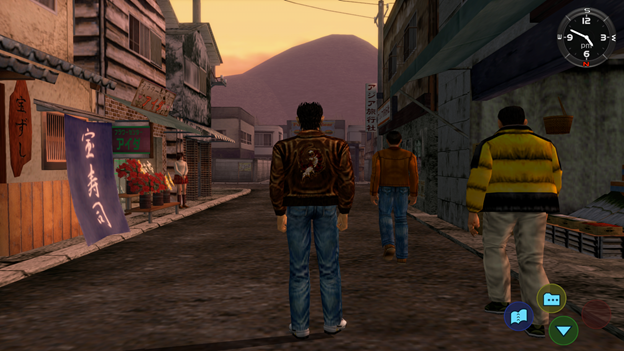
The only drawback is that the U.S. version of Shenmue lacks Japanese subtitles. So, although the game is packed with opportunities for listening and interpretation practice, Shenmue is not the best resource for imprinting kanji characters into your memory. That being said, there is plenty of written Japanese integrated into the game’s realistic scenery, so Shenmue is useful for learning and recalling kanji and vocabulary associated with names, signboards, retail shops, and other aspects of Japanese urban life.
Final Fantasy VII (2012 – 2019 HD remasters)
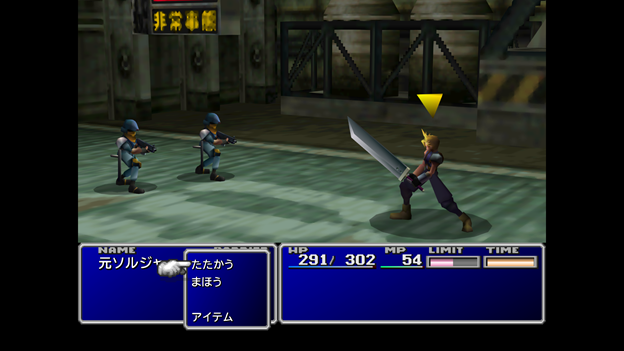
- Version: PC (also available on Xbox One, PlayStation 4, Nintendo Switch, iOS, and Google Play)
- Features: Japanese text dialogue and interface
One of the best ways to enjoy the Japanese language is by diving into one of the greatest games of all time. To be clear, I’m referring to the original Final Fantasy VII—not the recently released Final Fantasy VII Remake. The latter is a masterpiece in its own right, but many beginner- and intermediate-level Japanese learners will find the 2020 remake too complex to enjoy as study material.
Although this game has “fantasy” in its title, the narrative actually takes place in a contemporary (if not futuristic) setting with steampunk and cyberpunk influences. This means that despite plenty of jargon (easily identified via katakana), there’s plenty of practical dialogs to learn and review.
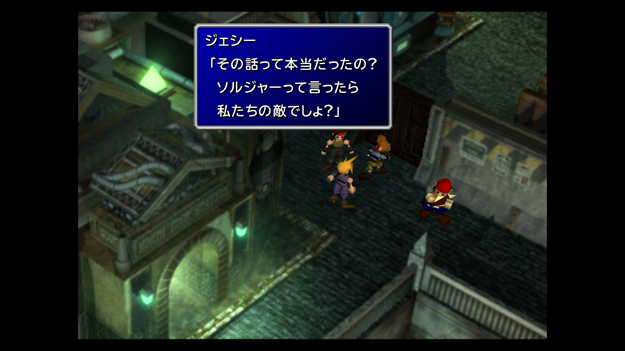
Keep in mind that since this game was originally released in 1997, there is no spoken dialog. So, for studying Japanese, Final Fantasy VII is all about reading practice and vocabulary building. Lastly, be careful about the platform on which you play the game. For console and mobile versions of Final Fantasy VII, you may have to change the language/location settings for the entire interface of your device to access the Japanese version of the game.
Octopath Traveler
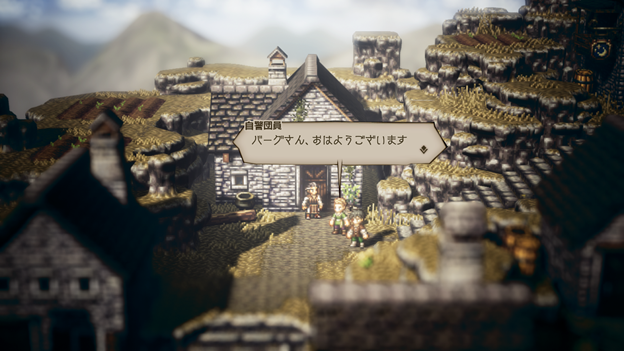
- Version: Xbox One (also available on PlayStation 4, Nintendo Switch, and PC)
- Features: Partially voiced Japanese dialogue; text dialogue and interface
This modern take on the classic role-playing-game formula is a critical darling and a superb game for studying Japanese. Despite its fantasy/medieval setting, there is plenty of practical Japanese to be found throughout the narrative—especially when interacting with NPCs (non-player characters) that populate the villages and towns throughout the game.
Unlike the two games above, Octopath Traveler includes dialogue bubbles with fully synched Japanese text and audio, appearing at a pace you control. This means that you can practice reading, listening, and shadowing, all in one game.
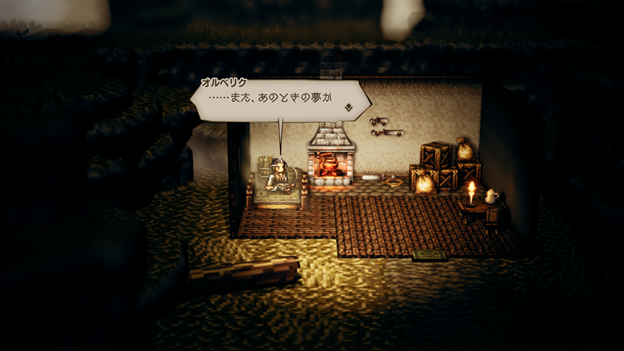
As if all this wasn’t enough, Octopath Traveler has a superb interface that allows you to switch languages instantly. This means that for repeatable dialog (i.e. conversations with the aforementioned NPCs), you can read something in Japanese then immediately confirm your understanding by switching the game into English with just a few button presses.

Making the Most of Your Experience
I selected these games because they lie at the intersection of entertainment and education–a perfect storm for motivation. However, learning requires reviewing, so it’s important to actively engage with these games with that in mind. My favorite way to do this is to add new words, kanji, and expressions to flashcard decks, complete with in-game screenshots to add context. Another popular approach is to create vocabulary spreadsheets such as the ones that accompany Japanese Quest YouTube videos.
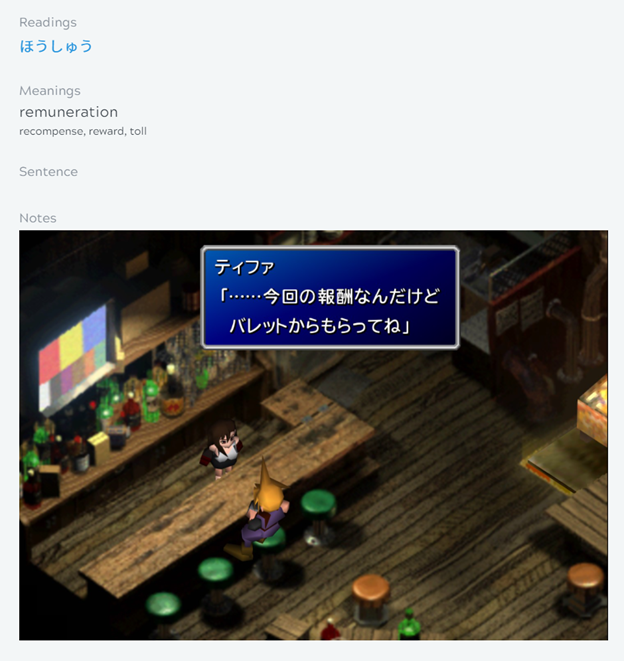
The flipside of a flashcard from my custom Final Fantasy VII deck in Kitsun.io. This card quizzes me on meaning and reading for the kanji 報酬.
Just Getting Started
This article contains just a handful of games that I have found useful for studying Japanese and is by no means exhaustive. There are plenty more games out there that fit the criteria established in this article, and perhaps I’ll cover them in future content.
In the meantime, which games do you recommend for studying Japanese? Share them in the comments below or via your favorite social media channel.





